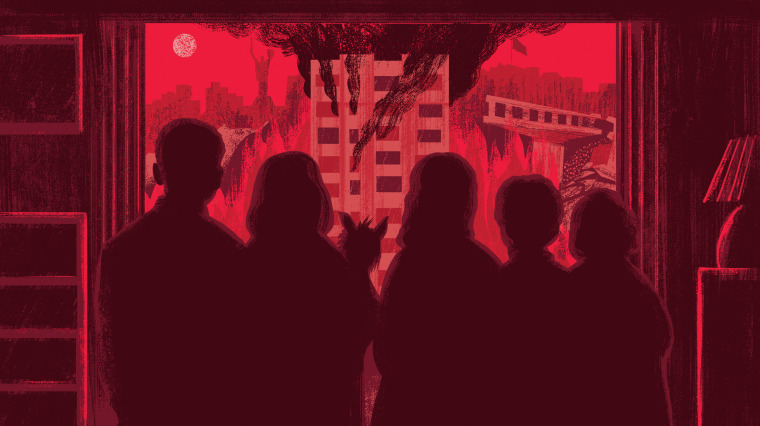The author is a 30-year-old lawyer living in Kyiv. Prior to the Russian invasion, he practiced law and most recently worked at the National Bank of Ukraine. He is now volunteering with a humanitarian aid organization dedicated to supporting Ukraine’s military and territorial defense forces. His family is now in the west of the country.
KYIV, Ukraine — The war caught up with my family in Bucha.
The town, some 20 miles northwest of Kyiv, is on the main highway to the west and then to Poland. We thought it was an ideal location to send my family if things started heating up in the capital, Kyiv, where I normally live. So my grandmothers, mother, sister and I felt prepared when the Russians invaded.
But war doesn’t care about your logistical plans. The Russians chose to begin their offensive in Hostomel, an airfield 3 miles away.
So, on the second day, we were surrounded, with explosions hitting on all four sides of the house belonging to my father’s mother.
We still believed that as unarmed civilians, we would not become targets. We were wrong.
On the third day, our electricity, internet and cellphones were cut off. We were blindfolded.
Blasts sounded continuously. From time to time, after particularly loud blasts, the sky over Hostomel and Kyiv turned crimson.
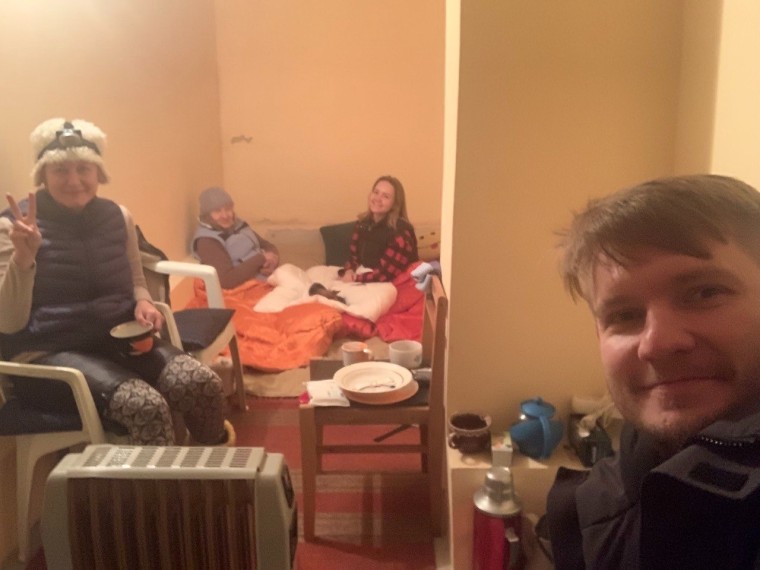
Early morning was the time for fighter jets. Every time I heard their low, loud whistle, a voice in my head whispered that a bomb would fall on our house.
We had food to last us about a week, so every few days we went out in search of provisions. The shops were closed, but sometimes we got lucky. One day, a local market distributed leftover food; I watched hundreds of people trying to snatch up a pack of tea or an orange.
At the beginning of March, we went outside to get water from the pump station. We walked to the end of the street and came across Russian armored vehicles with “V” painted on them. Two Russian soldiers stood nearby, staring at us.
Without blinking, we slowly turned around and went back home. My mind was paralyzed by fear, but my body moved. The next day, we still had to go for water because there was no other way.
We began to live in the basement of the house, where it was 5 to 7 degrees Celsius (41 to 44.6 Fahrenheit).
Then on March 5, an enemy tank entered our street, shot a home across from us, and then aimed at a church dome. The noise was as if all the bells of the world were ringing in one moment. I don’t know how our windows withstood the attack.
From the top floor of our house, we watched a nearby apartment building in flames.
Columns of soldiers with white armbands started roaming the streets, walking in groups of five to seven about 3 feet apart.
That is when we realized that we couldn’t stay.
My sister, Maryna, 28, and I sat down at the kitchen table with our grandmothers, Liuba, 74, and Nina, 83, to try and convince them to leave. At first, they refused — my maternal grandmother Nina had lived in Bucha all her life. These were some of the most intense negotiations in my life but somehow we convinced them.
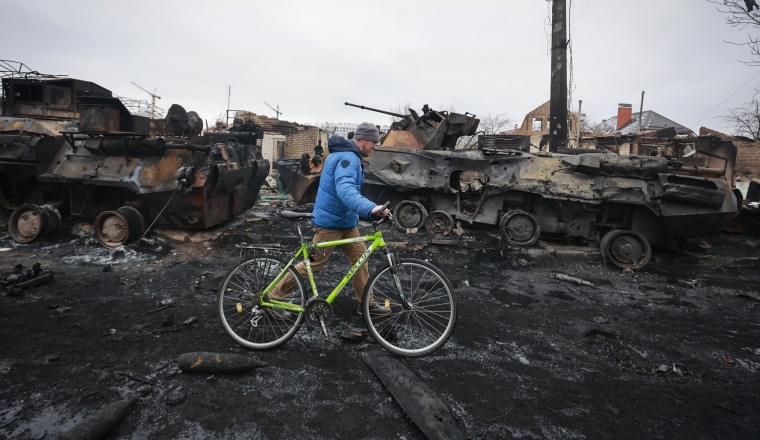
The next morning, we went outside. Neighbors saw us, and understood without words. They said that they were coming too. So then there were seven, plus Chip, our Yorkshire terrier.
We left behind the house that my late grandfather built with his own hands. My mother, Lyudmyla, and grandmother Nina knew every path and tree. We walked through places where we had learned to swim to reach Irpin some 5 miles away where the explosions were the loudest.
My mother was very worried that the march would kill my grandmothers. I thought a random missile would destroy us.
And so we walked and walked. We crept through the bushes and off roads until we finally saw a Ukrainian checkpoint. This meant that we had managed to get around the enemy and leave the city, leaving occupied Bucha behind.
At the entrance to Irpin, we were met by the Ukrainian territorial defense. When I saw a blue and yellow handkerchief on a soldier’s hand, my legs swayed with relief.
But a new disappointment was waiting in Irpin — there was no communication and no transportation. Many buildings were destroyed.
We saw broken kitchens, remnants of bedrooms, wallpaper in nurseries, pieces of mirrors in bathrooms. We thought about the residents of these apartments. Buildings were ablaze, bodies were lying on the ground.
We had nowhere else to go. We could not stay in Irpin. And so we went on.
The grandmothers were exhausted. I think the only thing that kept them on their feet was a desire to survive. But soon Liuba wasn’t able to walk -- she had walked close to 10 miles and just couldn’t go on unaided.
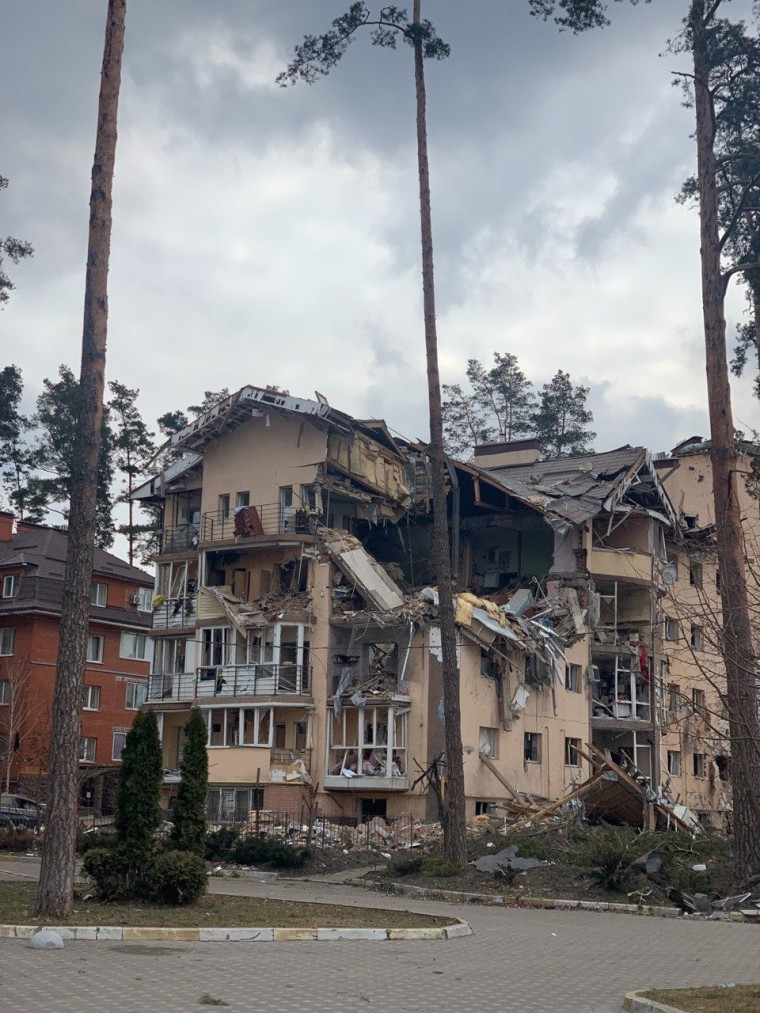
We approached Irpin’s last checkpoint. After that, there was a field, a road and a bridge over the river. There were several dozen houses behind the bridge, which made up the village of Romanivka. If there were evacuation buses, they had to be there. My home was there.
“Down!” a soldier shouted. We fell to the ground and I heard the familiar whistling. 3. 2. 1. Explosion.
As soon as we came to a field, shells hit houses on both sides of the bridge. Everything lit up, and the sky was covered with black smoke. Just as we left the checkpoint and had nowhere to hide, my grandmother Liuba’s legs finally surrendered — she just couldn’t walk anymore.
My sister and I took her by the arms and started dragging her behind us — Liuba in one hand, and a bag with all our valuables in the other.
Again a whistling sound. We fell to the ground, the shell slammed into a house somewhere to our left. I got up, grabbed my grandmother, picked up my sister and ran again. My mom, my other grandmother and neighbors ran ahead toward the bridge.
Another whistle, and a few seconds later another missile hit the bridge. Grandma shouted that we should leave her and run to the bridge by ourselves. We ignored her and kept on going.
I don’t know how we got there. I remember the military standing there, waving at us to run. When we finally arrived, we were not allowed across the river — the military made it clear that another missile could hit at any moment
We were so close to Kyiv. Some hundreds of meters to our home. Another whistle, and this time two shells hit the field to our right.
I stood under the bridge, watching people tremble and cry.
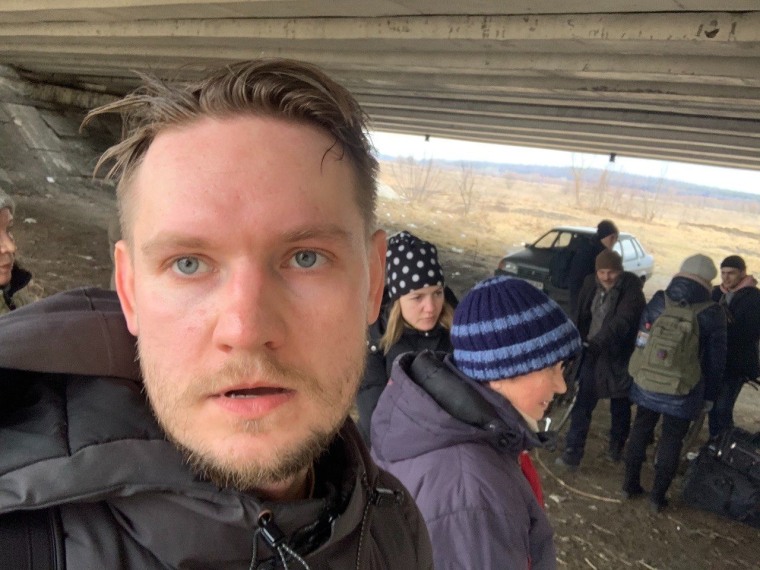
Russia had made me a refugee in my own home. Moreover, it wants to bury me on my own land. Something clicked in me at that moment, a powerful internal protest. I started repeating to myself that I was not going to die there. Not today. Not near Irpin. And not from the Russians.
The military signaled that we should move to the river. My sister and I carried our grandmother across on a thin board.
“Just not a shell, please,” I repeated to myself.
Step by step, step by step and we were finally on the other shore.
A bus approached us. There was almost no space, so I pushed my grandmother on, closed the door, and ran toward the checkpoint.
I ran, and my sister and a number of strangers were running nearby. In front was a Ukrainian checkpoint. Two girls in military uniforms stood behind and waved. Fifty meters, 45 meters. 40 meters. 30. 20. 10. It seemed to me that this would never end.
An ordinary passenger bus arrived. My mother, grandmother and our neighbors were already sitting inside.
I watched my mother pull out our little Yorkie, which she had carried under her jacket from Bucha. I looked at both my grandmothers. I looked out the window. When we got to Kyiv, I cried.
